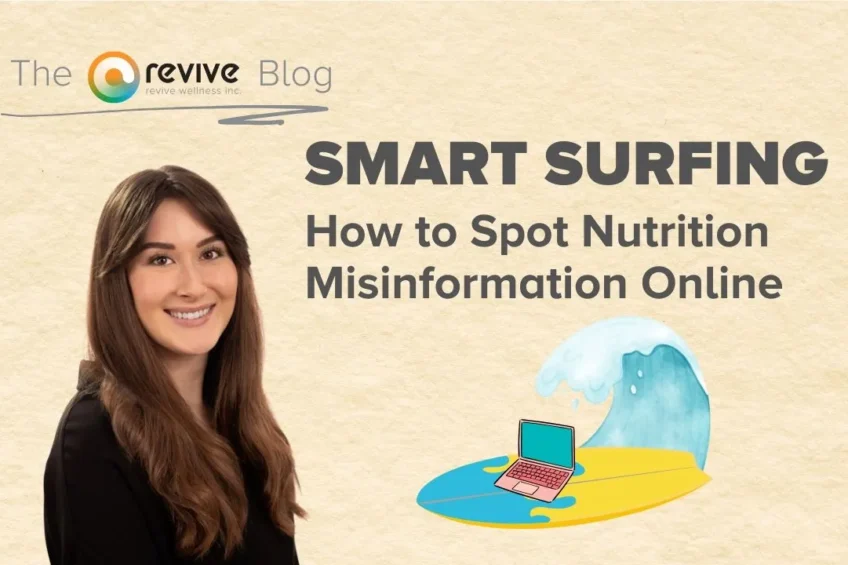Smart Surfing: How to Spot Nutrition Misinformation Online
- Laura Velcoff
- December 18, 2024
There’s a lot of health and nutrition advice on the internet, but not all of it is true. Influencers and celebrities often share diets, supplements, or products to make money, even if they don’t fully understand them. This can make it hard to know what advice to trust.
Here’s how to look for red flags (bad advice) and green flags (good advice) to help you decide.
Personal Stories vs. Science
- Red Flag: If the advice only includes personal success stories, be careful. These stories might sound good, but they usually don’t have proof to back them up. People giving reviews may have been paid or given free products.
- Green Flag: Trusted advice is based on science. Look for studies like randomized control trials or summaries of many studies (called meta-analyses). Good sources explain both the benefits and where more research is needed. Ask a Registered Dietitian (RD) to help if you’re unsure.
Extreme Claims vs. Realistic Advice
- Red Flag: Watch out for promises like “quick fixes” or “miracle cures.” If someone says one diet or product can solve many health problems, it’s probably not true (1).
- Green Flag: Trustworthy advice is realistic and based on facts. Reliable sources explain how things work and don’t promise instant results. If it sounds too good to be true, it probably is.
Buzzwords vs. Clear Information
- Red Flag: Words like “detox,” “natural,” or “toxin-free” might sound good but often don’t mean much. Be cautious of vague phrases like “balance your system” that don’t have scientific proof (1).
- Green Flag: Good advice avoids buzzwords and uses simple, science-based language. Experts will explain how and why something works without using tricks or confusing language.
Selling Products vs. Honest Advice
- Red Flag: Be careful if someone is focused on selling weight loss programs, supplements, or herbs. They might skip talking about risks or side effects because they’re trying to make money.
- Green Flag: Trusted sources share unbiased advice. If they recommend a product, they will also explain the risks and benefits so you can make an informed choice.
Old vs. Updated Information
- Red Flag: Advice based on old studies might not be reliable. Even research from five years ago might be outdated as science keeps changing.
- Green Flag: Reliable sources update their information regularly. Look for recent dates in articles or notes that state when the information was last reviewed.
Trustworthy Websites vs. Questionable Sites
- Red Flag: Websites with lots of ads or no sources for their claims can be misleading. Blogs or sites that focus on selling products may not be reliable.
- Green Flag: Trusted websites include:
- .gc.ca: Canadian government sites
- .gov: U.S. government sites
- .edu: U.S.-based university or school sites
- .org: Nonprofits (but verify if they use trusted sources, as not all nonprofits are regulated) (2).
Experts vs. Unqualified Individuals
- Red Flag: Be careful with advice from people who are not trained in nutrition, like chiropractors, fitness trainers, or influencers. Even doctors may not have enough nutrition training unless they’ve studied it specifically (3).
- Green Flag: Trust advice from experts like:
- Registered Dietitians (RDs): Nutrition experts with special training.
- Registered Nutritionists: In some places, like Alberta, “nutritionist” means an RD, but this isn’t true everywhere. Check their qualifications (4).
- Certified Medical Professionals: This includes doctors or specialists with extra nutrition training.
Conclusion
It’s not always easy to tell good advice from bad, but spotting these red and green flags can help. If you’re still unsure, book a free 15-minute call with one of our Registered Dietitians. We can help you find reliable information and avoid common nutrition myths!
Below is a table to help you tell reliable sources from unreliable ones!
| Topic | A reliable source of nutrition information: | An unreliable source of nutrition information: |
|---|---|---|
| Sources and References | – Uses reliable websites like government sites or science journals. | – Uses personal stories or fake reviews. |
| Authors and Credentials | – Is written by a health expert, like a registered dietitian, who shares both “good” and “bad” sides of a product or program. – Tells you to check with your doctor for personal advice. | – Comes from someone without proper nutrition training, like a social media influencer or chiropractor. |
| Date and Relevancy | – Shows when the information was last updated. | – Only uses old research and ignores new studies. – Doesn’t show when the information was last updated. |
| Language and Terminology | – Explains medical words in simple language. | – Uses fancy words without explaining them. – Says things like “detox your body” that aren’t backed by science. |
| Outcomes | – Talks about both the benefits and risks of diets or supplements. – Does not promise quick fixes or perfect results. | – Tries to make you buy something quickly by saying it’s running out or will change your life. |
References
- Barrett, S. (2022, December 25). The semantics of quackery. Quackwatch. https://quackwatch.org/the-semantics-of-quackery/
- NIH National Institute on Aging (NIA). (Reviewed 2023, January 12). How to find reliable health information online. https://www.nia.nih.gov/health/how-find-reliable-health-information-online
- Barrett S, London WM, Kroger M, et al. Consumer health: A guide to intelligent decisions. 9th ed. New York: McGraw-Hill Education; 2003.
- College of Dietitians of Alberta. (2023, June 23). Is my Dietitian Registered? https://collegeofdietitians.ab.ca/public/how-do-i-know-my-dietitian-is-registered/
About the Author

Laura Velcoff
I am all about helping people find joy in food again. Whether you are experiencing side effects of cancer, struggling with gut symptoms, or just wanting to relearn how to enjoy your meals, I’ve got your back. Together, we can make a positive impact by using strategies that are not only backed by evidence, but also guide you towards lasting behaviour change. Change can be so tough, but incredibly empowering when taking control of your own health. I am very excited to work alongside you in supporting your mind, body, and overall well-being!

